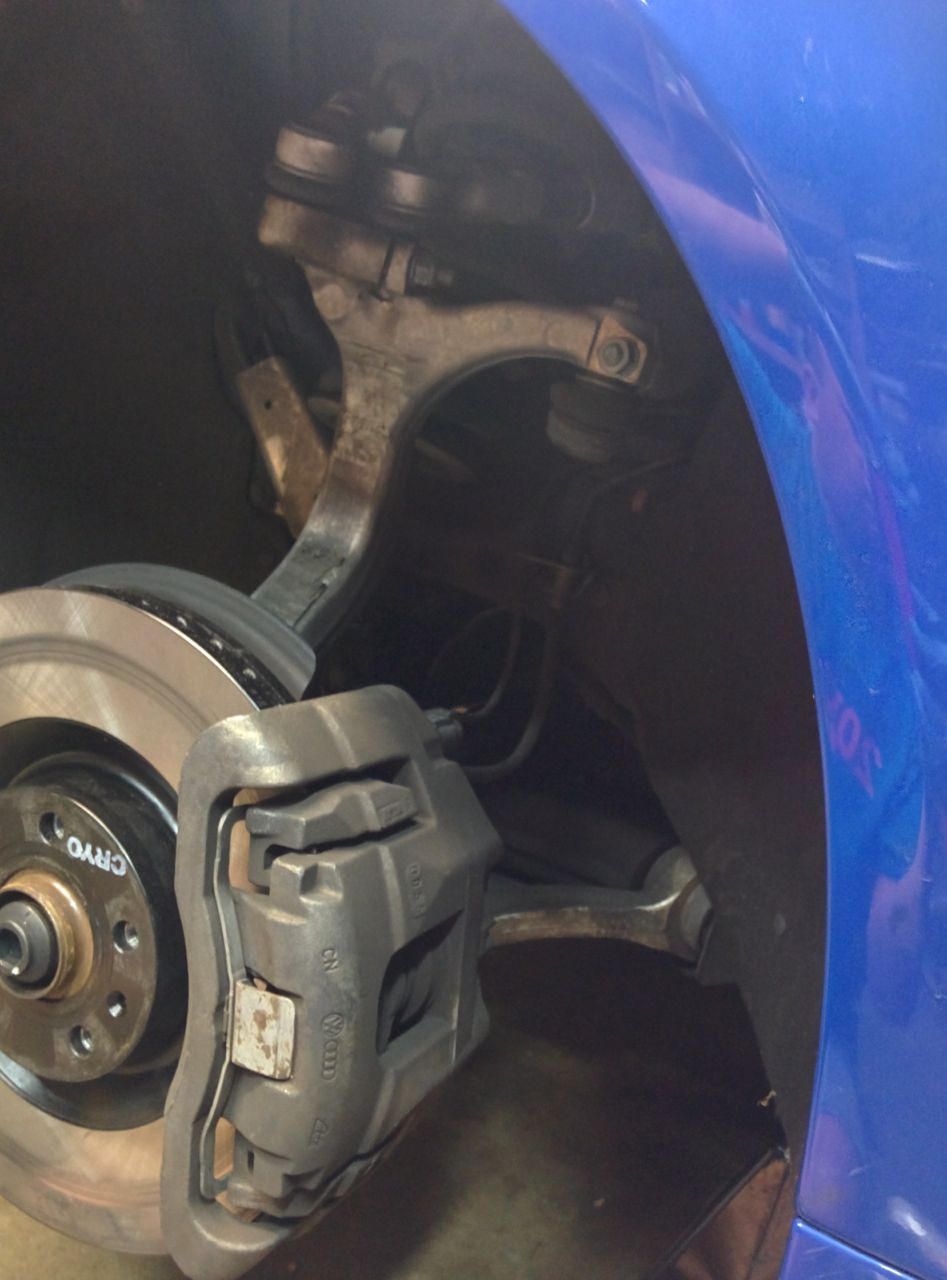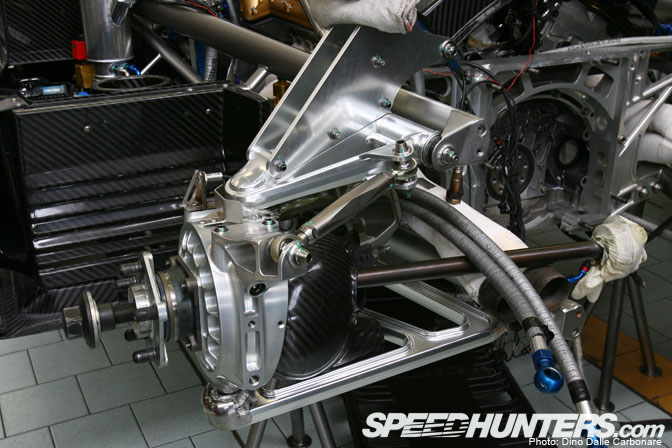Ok, Suspension geometry. Probably arguably the most important thing to a vehicles handling, (some say it's tires, but hey I said arguably.)
Double unequal length wishbone, 4 bar linkage, trailing arm, torsion beam, McPherson strut, Watt's link, De Dion tube all sorts.
So let's talk about suspension, pros and cons.

Other than cost what's wrong with this set up? 928 Weissach axle semi trailing arm.
Ideally, I'd think minimal toe change on compression would be best. Although on solid rear axles, I do kinda like the feel of a bit of roll steer (where the rear axle angles a bit towards the outside of the turn as the body rolls), as it helps rotate the rear end around the turn without having as much slip angle on the tires.
There have been books written on this subject. Many books.
Keith Tanner wrote:
There have been books written on this subject. Many books.
Books don't have discussions, why you got to come up in here with your book-ified ways? huh?
This is why I don't invite you to my fort I build in the living room with the beer keg and printed off pictures from the GGA thread.
Seems that each would be directed at the vehicles tendencies.
FWD- understeer
RWD, particularly rear engine. Oversteer

RossD
UltimaDork
3/29/16 10:19 a.m.
What's the old saying: Any suspension will work, if you don't let it.
Note that both diagrams are for braking and turning. Position of driveshafts is not a factor. I'm guessing Porsche was looking for some stability on trailing throttle corner entry. Fair enough given that the 928 was supposed to replace the 911, and they were probably tired of 911s going backward through hedges.

There's a new type of double-wishbone suspension geometry to learn about, it doesn't have a proper name but you could call it the "double wishbone with supertall upright." A lot of new performance cars are using it, like the R35 and all of McLaren's supercars after the F1. From the recent BTCC thread, it looks like a BTCC Alfa-Romeo may have been the first to use it. It requires a massive upright so you have to put a lot of effort into keeping the upright light to keep the unsprung weight down. It can give you advantages is packaging, SAI and unsprung weight over other double wishbone suspension types.

And then there's FRICS, where hydraulics control squat/dive and roll and heave, and spring rates are chosen purely for ride comfort. It's most similar to Toyota's XREAS suspension, but much more complex. What I find most interesting about it is that it's not an active suspension system (although it could be set up this way), it's a passive adjustable system. The McLaren P1 is the best example of a car that uses this suspension to its fullest extent. It's groundbreaking stuff but also massively more complex and expensive than the old way of doing things where each corner of the car had an independent spring and damper, with maybe a sway bar and heave spring connecting the axle sides at most.

In reply to GameboyRMH:
Is that for geometry or a bit of packaging magic to get over the 20 x 10^1000" wheels they put on cars?
I'm guessing it lets you get the upper control arm above the tire, which means it can be longer.
Flight Service wrote:
In reply to GameboyRMH:
Is that for geometry or a bit of packaging magic to get over the 20 x 10^1000" wheels they put on cars?
Depends on how you look at it  It gets around a lot of the disadvantageous geometry changes that might be required to run super-wide wheels with a double wishbones and a conventional upright.
It gets around a lot of the disadvantageous geometry changes that might be required to run super-wide wheels with a double wishbones and a conventional upright.
It can also have an unsprung weight advantage, at the cost of more engineering effort & fabrication expense - the arms can be made thinner since they have more leverage against the hub now, but of course the upright now needs to be huge, light, and strong all at the same time.
And then there's the old Jag IRS... Double wishbone with the axle shaft acting as the upper link 
That super-tall-upright geometry looks familiar to any '88-00 Honda Civic owner.
Your as-drawn suspension geometry doesn't matter.
Your as-installed-and-under-cornering-load geometry is what does.
Double A-arm suspensions with rack and pinion steering win races because they put the structure further from the neutral axis than other practical geometries, giving higher stiffness for the same weight.

codrus
Dork
3/29/16 12:23 p.m.
iadr wrote:
It's everywhere, but Hyundai Sonata's XG circa 2000, and Chrysler Cirrus and family around the same time... and VW Passat.
The VW/Audi version is technically multi-link (four I-shaped arms with separate balljoints, rather than two A-shaped ones with one ball joint each).

But yes, this is a big packaging win over a traditional double a-arm. It does limit how much tire you can put on the car, though.

kb58
Dork
3/29/16 12:43 p.m.
GameboyRMH wrote:
There's a new type of double-wishbone suspension geometry to learn about, it doesn't have a proper name but you could call it the "double wishbone with supertall upright."
As was said, this has been around for 25 years or so.
GameboyRMH wrote:
And then there's FRICS, where hydraulics control squat/dive and roll and heave, and spring rates are chosen purely for ride comfort. It's most similar to Toyota's XREAS suspension, but much more complex. What I find most interesting about it is that it's not an active suspension system (although it could be set up this way), it's a passive adjustable system. The McLaren P1 is the best example of a car that uses this suspension to its fullest extent. It's groundbreaking stuff but also massively more complex and expensive than the old way of doing things where each corner of the car had an independent spring and damper, with maybe a sway bar and heave spring connecting the axle sides at most.
Pretty sure the original Mini did the cross-coupled fluid thing, and maybe Citroen as well, back in the late 1950s and into the 1960s.

SVreX
MegaDork
3/29/16 1:52 p.m.
How about linear electromagnetic active suspension??

Technically not geometry, but clearly goes a long way toward dramatically affecting the handling.
Bose Suspension

kb58
Dork
3/29/16 2:09 p.m.
SVreX wrote:
...Bose Suspension
Ugh, double the expected price in that case.

SVreX
MegaDork
3/29/16 2:17 p.m.
In reply to kb58:
I was speaking to the advanced interesting technology and design, not the price nor the over-priced brand name.

JBasham
New Reader
3/29/16 3:08 p.m.
One of the cars I track is a light, front-engine semi-trailing arm rig with no anti-anything. It has urethane trailing arm bushings, rear subframe mounts, and rear sway-bar bushings. Back when it had rubber, things felt a tad imprecise but the urethane sharpened it up quite nicely.
Throttle-lift oversteer (when the rear is loaded) is a real issue for a driver who is learning the car. But it is easy to train away, and somewhat harder but still entirely possible to train the driver how to countersteer. Kind of a fun setup, really.
It's cheap and effective as long as you keep an eye on the bushing tabs.
iadr wrote:
The early ones with the hollow iron knuckle didn't have that upper, IIRC. Maybe not even the first few years of aluminum knuckle.
The photo is of a B6, my 2004 S4. The B5 I had previously is essentially the same geometry-wise (don't remember materials), the aftermarket adjustable arms in that photo are actually interchangeable between the two chassis.
The C4 cars are struts, I think.
SVreX wrote:
In reply to kb58:
I was speaking to the advanced interesting technology and design, not the price nor the over-priced brand name.
Apparently the weight of the fully active Bose thing is high enough that it's effectively DOA.

SVreX
MegaDork
3/29/16 4:01 p.m.
In reply to codrus:
Huh. I hadn't heard that.
I will take one of these thank you very much.










































